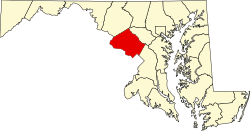Poolesville, Maryland | |
|---|---|
 View west along Maryland State Route 107 (Fisher Avenue) at Norris Road | |
 Location of Poolesville, Maryland | |
| Coordinates: 39°07′55″N77°24′34″W / 39.13194°N 77.40944°W | |
| Country | |
| State | |
| County | Montgomery |
| Settled | 1760 |
| Incorporated | 1867 |
| Government | |
| • Type | Board of Commissioners/Manager |
| Area | |
• Total | 3.95 sq mi (10.23 km2) |
| • Land | 3.93 sq mi (10.18 km2) |
| • Water | 0.019 sq mi (0.05 km2) |
| Elevation | 390 ft (120 m) |
| Population (2020) | |
• Total | 5,742 |
| • Density | 1,460/sq mi (564/km2) |
| Time zone | UTC-5 (EST) |
| • Summer (DST) | UTC-4 (EDT) |
| ZIP code | 20837 |
| Area codes | 301, 240 |
| FIPS code | 24-62850 |
| GNIS feature ID | 2391366 [2] |
| Website | poolesvillemd |
Poolesville is a U.S. town in the western portion of Montgomery County, Maryland. The population was 5,742 at the 2020 United States census. [3] It is surrounded by (but is technically not part of) the Montgomery County Agricultural Reserve, [4] and is considered a distant bedroom community for commuters to Washington, D.C.
Contents
- History
- Geography
- Government
- Demographics
- 2000 census
- 2010 census
- Education
- Transportation
- Notable people
- References
- External links
The name of the town comes from the brothers John Poole Sr. and Joseph Poole Sr. who owned land in what is now Poolesville. Due to an historical anomaly, until 2010 the legal name of the town was "The Commissioners of Poolesville". [5] Residents overwhelmingly voted to formally change the name to "The Town of Poolesville" in the November 2010 general election. [6]


